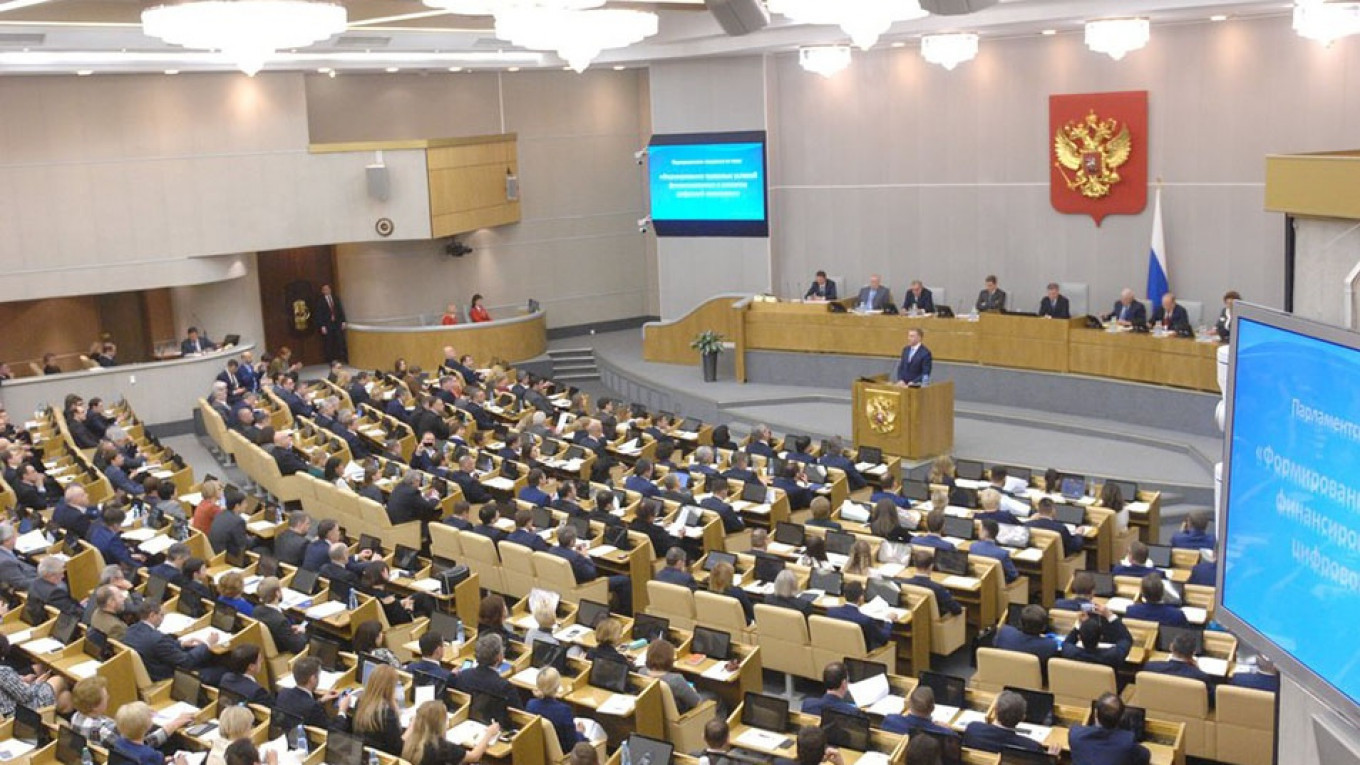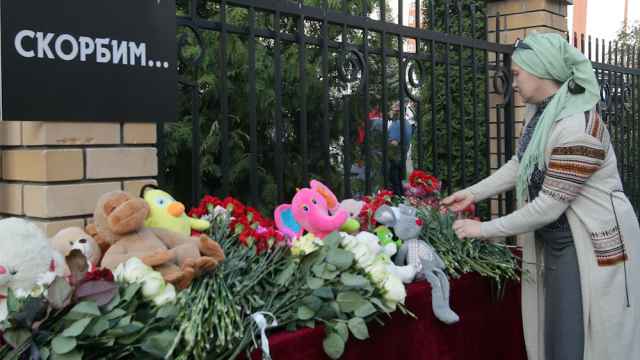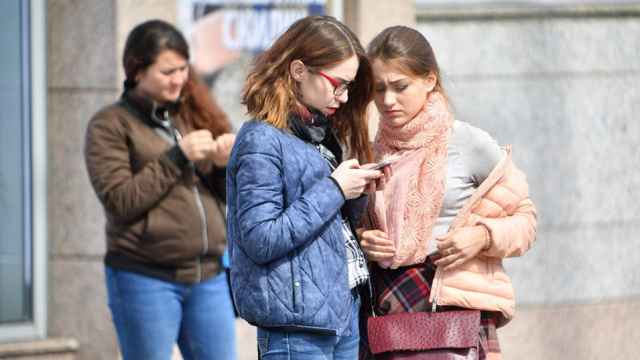Lawmakers in Russia’s lower house of parliament, the State Duma, have passed over a dozen laws this week that expand the government’s powers while imposing new restrictions on free speech and information access.
State Duma deputy Dmitry Vyatkin authored many of the bills, which have moved through parliament at breakneck pace in what observers call an effort to restrain Russia’s opposition ahead of the 2021 legislative elections.
Here’s a roundup of the sweeping legislative changes that appear likely to become law:
Prohibiting disclosure of security officials’ personal data
The State Duma on Wednesday passed a bill in its third and final reading to prohibit the sharing of personal data and information about the work of intelligence officers, law enforcement agencies, the military and judges.
The move follows a joint media investigation led by Bellingcat and CNN that named several alleged FSB chemical-weapons experts who tailed opposition figure Alexei Navalny for several years and were involved in his poisoning. The investigation was based on information taken from flight manifests, mobile phone bills and other data purchased on the black market due to a separate Russian law that allows the sale of personal data.
The new legislation makes sharing information about police and investigators, as well as Foreign Intelligence Service (SVR) and FSB agents, a criminal offense.
The new law will protect security members’ personal data “regardless of direct threats to their security,” an explanatory note states. Previous legislation made it a criminal offense to share security members’ data when doing so threatened their lives.
Allowing Russia to Block YouTube, Twitter, Facebook
Also on Wednesday, the State Duma passed a bill in its third reading that would allow the federal media watchdog to block websites, including social media sites, if they are found to "restrict important information on Russian territory" or contradict state media coverage of foreign sanctions against Russia or its citizens.
Internet platforms found to be violating the law would be added to a blacklist of websites “involved in violations of fundamental human rights and freedoms of Russian citizens” and the media watchdog, Roskomnadzor, would introduce restrictive measures.
In an explanatory note attached to the bill, the authors wrote that authorities have been receiving complaints this year from Russian media that their accounts have been censored by "foreign internet platforms Twitter, Facebook and YouTube." Earlier this year the U.S. tech giants introduced labels for state-affiliated media outlets.
Critics have accused Russian authorities of following in China’s footsteps by seeking heavier internet restrictions and a separate Russian internet. This summer, Russian walked back its failed attempt to block the popular encrypted messaging app Telegram.
More restrictions on public protests
The State Duma also passed a bill to prohibit the financing of protests and rallies from abroad and require organizers of political events to disclose the sources of their funding.
According to the bill’s explanatory document, money for rallies of 500 people may only be transferred to a Russian bank account and rally organizers must disclose the account numbers with the authorities. Donors will also be required to disclose their personal data when transferring funds.
Under the bill, political campaigns would be banned from accepting money or property from foreign states, organizations, NGOs or citizens; international organizations and movements; unregistered public associations or individuals labeled as “foreign agents”; Russians younger than 16; anonymous donors; and legal entities created less than a year before the money transfer.
Another bill affecting public protests would label lines for single-picket protests as mass rallies and ban protests outside law enforcement and security buildings. This bill would also prohibit journalists from concealing their press badges while covering rallies.
Imprisonment or forced labor for spreading libel online
A bill approved by lawmakers in its final reading would punish those found guilty of spreading libel online with up to two years in prison. State Duma deputy Vyatkin, the bill’s author, has said these amendments to Article 128.1 of the Criminal Code are aimed at bloggers and authors of Telegram channels.
The bill would also expand the types of punishments for posting libel on the internet. Currently, fines or compulsory labor have been relied on for libel "against several persons, including individually undefined ones," while the new amendments introduce imprisonment, forced labor and arrest.
“The very fact of the threat of such a punishment can sober someone up," Vyatkin said.
Expanded ‘foreign agents’ law
Russian lawmakers on Wednesday passed in its final reading controversial draft legislation that includes an expansion of who can be labeled a "foreign agent."
Under the changes, any individual — including those running for office — could be deemed a foreign agent if they receive any material or monetary support from abroad, or from organizations already deemed foreign agents.
The law will also bar those individuals from holding municipal government positions.
Groups or individuals deemed foreign agents had previously been required to register with the Justice Ministry, label publications with the tag and submit detailed paperwork or face fines.
The State Duma announced that it had increased the punishment for failure to comply that could see culpable individuals receiving sentences of up to five years in prison.
Prison time for blocking a street
A bill establishing criminal liability and imprisonment for up to a year for blocking traffic on roads, highways and city streets passed through the State Duma in its third reading on Wednesday.
The bill would amend Article 267 of the Criminal Code, which in its current form only provides for criminal liability if the blockage inflicts serious harm to human health or damages over 1 million rubles. If someone died because of the blockage, those found guilty face up to eight years in prison; if more than one person died, the maximum prison sentence increases to 10 years.
AFP contributed reporting.
A Message from The Moscow Times:
Dear readers,
We are facing unprecedented challenges. Russia's Prosecutor General's Office has designated The Moscow Times as an "undesirable" organization, criminalizing our work and putting our staff at risk of prosecution. This follows our earlier unjust labeling as a "foreign agent."
These actions are direct attempts to silence independent journalism in Russia. The authorities claim our work "discredits the decisions of the Russian leadership." We see things differently: we strive to provide accurate, unbiased reporting on Russia.
We, the journalists of The Moscow Times, refuse to be silenced. But to continue our work, we need your help.
Your support, no matter how small, makes a world of difference. If you can, please support us monthly starting from just $2. It's quick to set up, and every contribution makes a significant impact.
By supporting The Moscow Times, you're defending open, independent journalism in the face of repression. Thank you for standing with us.
Remind me later.






